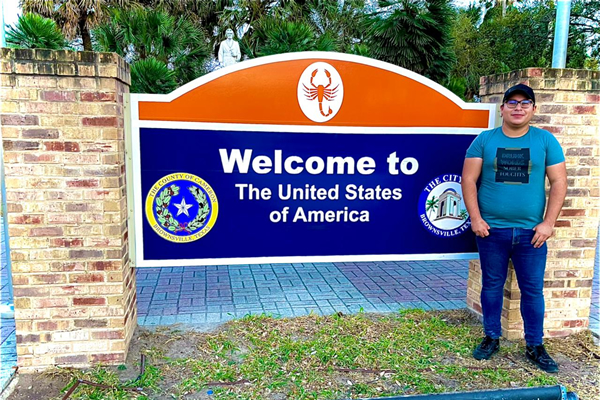National
Biden administration ends ‘Remain in Mexico’ policy
Trump-era program made LGBTQ asylum seekers even more vulnerable

The Biden administration has officially ended a policy that forced asylum seekers to pursue their cases in Mexico.
The previous White House’s Migrant Protection Protocols program, which became known as the “Remain in Mexico” policy, took effect in 2019. Advocates sharply criticized MPP, in part, because it made LGBTQ asylum seekers who were forced to live in Tijuana, Ciudad Juárez, Matamoros and other Mexican border cities even more vulnerable to violence and persecution based on their gender identity and sexual orientation.
The White House in January suspended enrollment in MPP shortly after President Biden took office.
Homeland Security Secretary Alejandro Mayorkas on Tuesday in a memo he sent to acting U.S. Customs and Border Protection Commissioner Troy Miller, acting U.S. Immigration and Customs Enforcement Director Tae Johnson and acting U.S. Citizenship and Immigration Services Director Tracy Renaud that announced the end of the Trump-era policy said roughly 11,200 asylum seekers with MPP cases have been allowed into the U.S. between Feb. 19 and May 25. Estuardo Cifuentes, a gay man from Guatemala who ran Rainbow Bridge Asylum Seekers, a program for LGBTQ asylum seekers and migrants in Matamoros that the Resource Center Matamoros, a group that provides assistance to asylum seekers and migrants in the Mexican border city, helped create, is among them.
“MPP does not adequately or sustainably enhance border management in such a way as to justify the program’s extensive operational burdens and other shortfalls,” wrote Mayorkas in his memo.
“In deciding whether to maintain, modify, or terminate MPP, I have reflected on my own deeply held belief, which is shared throughout this administration, that the United States is both a nation of laws and a nation of immigrants, committed to increasing access to justice and offering protection to people fleeing persecution and torture through an asylum system that reaches decisions in a fair and timely manner,” he added. “To that end, the department is currently considering ways to implement long-needed reforms to our asylum system that are designed to shorten the amount of time it takes for migrants, including those seeking asylum, to have their cases adjudicated, while still ensuring adequate procedural safeguards and increasing access to counsel.”
Steve Roth, executive director of the Organization of Refuge, Asylum and Migration, a Minnesota-based organization that works with LGBTQ refugees and migrants around the world, welcomed the end of MPP.
“We’re very happy to see, at long last, the termination of the dangerous and illegal ‘Remain in Mexico’ policy that was put in place by the Trump administration in early 2019,” Roth told the Washington Blade in a statement. “This policy forced asylum seekers at our Southern border — including many LGBTIQ individuals — to spend months and sometimes years in dangerous Mexican border towns while they waited for their asylum cases to be processed.”
Roth added MPP “was not in keeping with the United States’ commitments to international asylum law and it was not reflective of who we are as a country.”
“We’re grateful to President Biden and his administration for overturning this policy and for their commitment to a just and humane immigration and asylum system,” he said.
Immigration Equality Legal Director Bridget Crawford echoed Roth.
“President Trump created a humanitarian disaster with this policy that has resulted in well over a thousand asylum seekers being assaulted, raped, kidnapped or murdered while awaiting their asylum hearing, including LGBTQ and HIV-positive people,” Crawford told the Blade in a statement.
Ending MPP is the latest in a series of steps the Biden administration has taken to reverse the previous White House’s hardline immigration policies.
State Department spokesperson Ned Price told the Blade last month that protecting migrants and asylum seekers who are fleeing persecution based on their gender identity and sexual orientation is one of the administration’s global LGBTQ rights priorities.
Vice President Kamala Harris is among the administration officials who have publicly acknowledged that anti-LGBTQ violence is a “root cause” of migration from Central America. Texas Congresswoman Veronica Escobar, whose district includes the border city of El Paso, and others have noted to the Blade that Title 42, a Centers for Disease Control and Prevention rule that closed the Southern border to most asylum seekers and migrants because of the coronavirus pandemic, remains in place.
Congress has yet to consider a comprehensive immigration reform bill that Democrats introduced in February. Crawford in her statement also notes Mayorkas’ memo “does not address the many thousands of individuals who were wrongfully denied relief under the MPP program.”
“These people no longer have ‘active’ cases, so they are not being processed by the administration, but many are living in Mexico or have been returned back to their countries where they face persecution. Quite literally, some of these people have been handed a death sentence,” said Crawford. “The Biden administration has not addressed these cases yet and whether people wrongfully denied relief under the MPP program will have an opportunity to renew their claims.”


The Comings & Goings column is about sharing the professional successes of our community. We want to recognize those landing new jobs, new clients for their business, joining boards of organizations and other achievements. Please share your successes with us at [email protected].
Congratulations to Gil Pontes III on his recent appointment to the Financial Advisory Board for the City of Wilton Manors, Fla. Upon being appointed he said, “I’m honored to join the Financial Advisory Board for the City of Wilton Manors at such an important moment for our community. In my role as Executive Director of the NextGen Chamber of Commerce, I spend much of my time focused on economic growth, fiscal sustainability, and the long-term competitiveness of emerging business leaders. I look forward to bringing that perspective to Wilton Manors — helping ensure responsible stewardship of public resources while supporting a vibrant, inclusive local economy.”
Pontes is a nonprofit executive with years of development, operations, budget, management, and strategic planning experience in 501(c)(3), 501(c)(4), and political organizations. Pontes is currently executive director of NextGen, Chamber of Commerce. NextGen Chamber’s mission is to “empower emerging business leaders by generating insights, encouraging engagement, and nurturing leadership development to shape the future economy.” Prior to that he served as managing director of The Nora Project, and director of development also at The Nora Project. He has held a number of other positions including Major Gifts Officer, Thundermist Health Center, and has worked in both real estate and banking including as Business Solutions Adviser, Ironwood Financial. For three years he was a Selectman, Town of Berkley, Mass. In that role, he managed HR and general governance for town government. There were 200+ staff and 6,500 constituents. He balanced a $20,000,000 budget annually, established an Economic Development Committee, and hired the first town administrator.
Pontes earned his bachelor’s degree in political science from the University of Massachusetts, Dartmouth.
Kansas
ACLU sues Kansas over law invalidating trans residents’ IDs
A new Kansas bill requires transgender residents to have their driver’s licenses reflect their sex assigned at birth, invalidating current licenses.

Transgender people across Kansas received letters in the mail on Wednesday demanding the immediate surrender of their driver’s licenses following passage of one of the harshest transgender bathroom bans in the nation. Now the American Civil Liberties Union is filing a lawsuit to block the ban and protect transgender residents from what advocates describe as “sweeping” and “punitive” consequences.
Independent journalist Erin Reed broke the story Wednesday after lawmakers approved House Substitute for Senate Bill 244. In her reporting, Reed included a photo of the letter sent to transgender Kansans, requiring them to obtain a driver’s license that reflects their sex assigned at birth rather than the gender with which they identify.
According to the reporting, transgender Kansans must surrender their driver’s licenses and that their current credentials — regardless of expiration date — will be considered invalid upon the law’s publication. The move effectively nullifies previously issued identification documents, creating immediate uncertainty for those impacted.
House Substitute for Senate Bill 244 also stipulates that any transgender person caught driving without a valid license could face a class B misdemeanor, punishable by up to six months in jail and a $1,000 fine. That potential penalty adds a criminal dimension to what began as an administrative action. It also compounds the legal risks for transgender Kansans, as the state already requires county jails to house inmates according to sex assigned at birth — a policy that advocates say can place transgender detainees at heightened risk.
Beyond identification issues, SB 244 not only bans transgender people from using restrooms that match their gender identity in government buildings — including libraries, courthouses, state parks, hospitals, and interstate rest stops — with the possibility for criminal penalties, but also allows for what critics have described as a “bathroom bounty hunter” provision. The measure permits anyone who encounters a transgender person in a restroom — including potentially in private businesses — to sue them for large sums of money, dramatically expanding the scope of enforcement beyond government authorities.
The lawsuit challenging SB 244 was filed today in the District Court of Douglas County on behalf of anonymous plaintiffs Daniel Doe and Matthew Moe by the American Civil Liberties Union, the ACLU of Kansas, and Ballard Spahr LLP. The complaint argues that SB 244 violates the Kansas Constitution’s protections for personal autonomy, privacy, equality under the law, due process, and freedom of speech.
Additionally, the American Civil Liberties Union filed a temporary restraining order on behalf of the anonymous plaintiffs, arguing that the order — followed by a temporary injunction — is necessary to prevent the “irreparable harm” that would result from SB 244.
State Rep. Abi Boatman, a Wichita Democrat and the only transgender member of the Kansas Legislature, told the Kansas City Star on Wednesday that “persecution is the point.”
“This legislation is a direct attack on the dignity and humanity of transgender Kansans,” said Monica Bennett, legal director of the ACLU of Kansas. “It undermines our state’s strong constitutional protections against government overreach and persecution.”
“SB 244 is a cruel and craven threat to public safety all in the name of fostering fear, division, and paranoia,” said Harper Seldin, senior staff attorney for the ACLU’s LGBTQ & HIV Rights Project. “The invalidation of state-issued IDs threatens to out transgender people against their will every time they apply for a job, rent an apartment, or interact with police. Taken as a whole, SB 244 is a transparent attempt to deny transgender people autonomy over their own identities and push them out of public life altogether.”
“SB 244 presents a state-sanctioned attack on transgender people aimed at silencing, dehumanizing, and alienating Kansans whose gender identity does not conform to the state legislature’s preferences,” said Heather St. Clair, a Ballard Spahr litigator working on the case. “Ballard Spahr is committed to standing with the ACLU and the plaintiffs in fighting on behalf of transgender Kansans for a remedy against the injustices presented by SB 244, and is dedicated to protecting the constitutional rights jeopardized by this new law.”
National
After layoffs at Advocate, parent company acquires ‘Them’ from Conde Nast
Top editorial staff let go last week

Former staff members at the Advocate and Out magazines revealed that parent company Equalpride laid off a number of employees late last week.
Those let go included Advocate editor-in-chief Alex Cooper, Pride.com editor-in-chief Rachel Shatto, brand partnerships manager Erin Manley, community editor Marie-Adélina de la Ferriére, and Out magazine staff writers Moises Mendez and Bernardo Sim, according to a report in Hollywood Reporter.
Cooper, who joined the company in 2021, posted to social media that, “Few people have had the privilege of leading this legendary LGBTQ+ news outlet, and I’m deeply honored to have been one of them. To my team: thank you for the last four years. You’ve been the best. For those also affected today, please let me know how I can support you.”
The Advocate’s PR firm when reached by the Blade said it no longer represents the company. Emails to the Advocate went unanswered.
Equalpride on Friday announced it acquired “Them,” a digital LGBTQ outlet founded in 2017 by Conde Nast.
“Equalpride exists to elevate, celebrate and protect LGBTQ+ storytelling at scale,” Equalpride CEO Mark Berryhill said according to Hollywood Reporter. “By combining the strengths of our brands with this respected digital platform, we’re creating a unified ecosystem that delivers even more impact for our audiences, advertisers, and community partners.”
It’s not clear if “Them” staff would take over editorial responsibilities for the Advocate and Out.
-

 Federal Government5 days ago
Federal Government5 days agoTwo very different views of the State of the Union
-

 Virginia5 days ago
Virginia5 days agoVa. activists preparing campaign in support of repealing marriage amendment
-

 Opinions5 days ago
Opinions5 days agoThe global cost of Trump’s foreign aid ideology
-

 Opinions4 days ago
Opinions4 days agoCriteria for supporting a candidate in D.C.




















